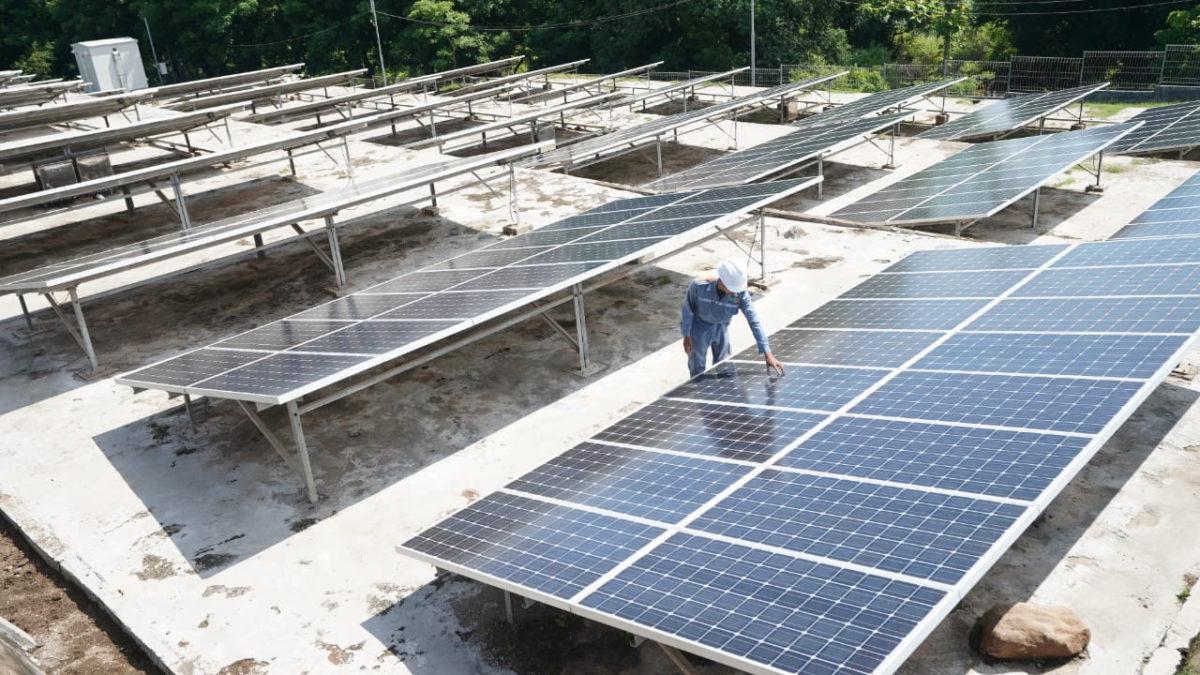A think tank and the government are working on an ambitious billion-dollar plan to recover Indonesia’s virus-ridden economy by installing thousands of rooftop solar panels.
The scheme ultimately entails installing panels with a combined capacity of 1 gigawatt of peak power GWp) a year for millions of Indonesia’s poorest households over the next four to five years. The scheme, dubbed the Solar Archipelago (Surya Nusantara) plan, is expected to cost Rp 15 trillion (US$1.07 billion) annually.
Local think tank Institute for Essential Services Reform (IESR), which initiated the plan, estimates the scheme will generate up to 22,000 jobs from installing the panels and save the government billions of dollars in electricity subsidies.
Cutting back subsidies is particularly attractive for the cash-strapped Indonesian government, namely the Energy and Mineral Resources and the Finance Ministry’s Fiscal Policy Agency (BKF), both of whom are working to develop the scheme.
“We expect implementation to start next year, but preparations must begin from today,” IESR executive director Fabby Tumiwa told The Jakarta Post on Tuesday.
Fabby, who is also a member of the Indonesian Solar Energy Association (AESI), said much work remained, including training new panel installers via a government training program. Indonesia currently lacks the manpower to install one GWp of panels each year.
He said the project would “realistically” kick off with 100-200 megawatt (MW) in Nusa Tenggara and Bali in its first year. Those provinces have the highest electricity supply costs (BPP) in Indonesia.
Energy analysts globally are calling for governments to invest in green technology as countries begin disbursing billions of dollars in post-COVID-19 economic recovery schemes.
The analysts argue that such investments could stimulate growth and create jobs without sacrificing environmental commitments.
“The period after the COVID-19 crisis could determine whether the world meets or misses the emissions goals of the 2015 Paris Agreement,” said consultancy McKinsey & Company in an article on May 27.
Indonesia, a signatory of the landmark Paris Agreement, has pledged to make solar contribute 5.7 percent of the country’s power by 2025, yet solar only contributed 0.1 percent last year.
The Indonesian government has budgeted Rp 695.2 trillion in economic recovery funds, slated for healthcare system, social safety nets, incentives for small businesses and job creation, among other things, but there is no specific mention of renewable energy.
“To put that money back into coal would be a mistake,” Rudolf Rauch, renewable energy program coordinator of the GIZ, Germany’s federal enterprise for international cooperation, told the Post on Monday.
Rauch commended the green economic recovery plan but pointed out that Indonesia lacked the manpower to “just jump” into installing 1GWp of panels. He suggested that the government start by installing 200 MW in the first year, then double the figure every following year.
The Energy ministry’s renewables director Harris said the ministry was in talks with the BKF over the plan. He also expected the scheme to create local employment opportunities and grow the domestic solar industry.
“Everyone can benefit, and the government can save on long-term subsidies,” Harris said.
The government has allocated Rp 97.42 trillion for this year’s energy subsidy, according to Presidential Regulation (Perpres) No. 54/2020 on the 2020 state budget revision. However, Finance Ministry Fiscal Policy Agency head Febrio Nathan Kacaribu said earlier this month that the energy subsidy budget had been lowered to Rp 92.2 trillion following the plunge in oil prices.
Indonesia currently has 31 million households eligible for electricity subsidies. The government spent Rp52.7 trillion on subsidies for those homes last year.
BKF special advisor Joko Tri Hariyanto said the agency was trying to diversify the green economic recovery program’s funding, such as by adding government debt papers (SUN) and sharia-compliant bonds (sukuk), instead of fully relying on the state budget (APBN), as IESR initially planned.
The BKF is currently awaiting feedback from the energy ministry and the IESR on the scheme, Joko told the Post on Friday.
“If the energy ministry were to redirect electricity subsidy funds, they would need to talk to PLN,” he said. “If this program does have a good multiplier effect, whether in terms of people’s income or local job creation, then that Rp 15 trillion may come from the state budget.”

